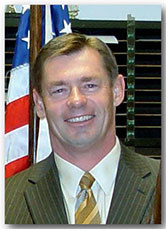This fall, the University of Iowa revamped its online tool for reporting potential policy violations. The UI Confidential Hotline provides a safe and convenient resource for people to raise questions related to finance and other areas.
Iowa Now talked to Terry Johnson, associate vice president and university controller, and Todd Stewart, chief audit executive for the Office of Internal Audit, about the hotline and the UI community’s collective role in supporting ethical standards.
What is the UI Confidential Hotline, and why is it important?

Johnson: It’s a service that offers an easy way to report potential policy violations, confidentially or anonymously. Users file reports online or by phone, and hotline staff forward information to UI personnel for review and investigation as needed.
We adopted this service because we want to enlist the university community’s help in policy compliance. From a practical perspective, we know that potential problems tend to be noticed at the local level. We also want to emphasize that each of us has a role in maintaining strong ethical practices.
How does the system work?

Stewart: EthicsPoint, a company that specializes in policy compliance issues, manages the hotline for the university. Initial reports go straight to EthicsPoint—the hotline system doesn’t reside on UI servers.
EthicsPoint processes reports and follows up with staff from the Office of Internal Audit. We evaluate the reports and determine how to follow up. We contact only the people needed to investigate and resolve the matter, and we don’t share reporters’ identities without their consent.
What kinds of issues are best reported through the hotline?
Johnson: The system is ideally suited to handle reports related to finances, health care compliance, human resources, information technology, intercollegiate athletics, research, and risk and safety.
It’s not an emergency service. Immediate dangers should be reported to 911.
It’s also best to report issues related to discrimination and harassment directly to the Office of Equal Opportunity and Diversity, and student conduct concerns directly to the Student Conduct Office. These issues usually can’t be addressed from anonymous reports.
Stewart: We also want people to remember that raising concerns directly is often the best first step. Many issues can be corrected quickly and openly without turning to a resource like the hotline.
UI employees can turn to their supervisors, while students can get help from instructors, advisers, or residence hall staff. The university’s ethics web page provides additional info on campus reporting options.
What do you tell anyone concerned that making a report might get them in trouble with their department or program?
Johnson: First, the university’s anti-retaliation policy forbids actions against people who report policy concerns in good faith. We need to safeguard students, staff, faculty, and others who help keep our university secure.
We protect the identities of individuals who’ve opted to provide their names when making reports. The hotline also permits anonymous reports with no names attached.
Stewart: For every report, the EthicsPoint system assigns a report number, a personal identification number, and a contact date. Reporters—even anonymous reporters—can check back on the status of their reports or provide additional information.
What do you hope to gain by updating the UI Confidential Hotline?
Johnson: We’ve had the system in place for several years, but think the changes we’ve introduced will make it more useful to the university community. We want people to see it as an option for reporting a wider range of issues.
We also want initiatives like this to expand the conversation about ethics and to make everyone more comfortable voicing concerns. Speaking up isn’t always easy, and we need to offer options that help people take that step.